The real estate industry is only one of the many industries artificial intelligence (AI) has changed. AI is becoming a vital tool for real estate agents, investors, buyers, sellers, and other stakeholders due to its capacity to analyze enormous volumes of data, automate procedures, and offer insightful analysis.
However, there’s still an unanswered question going on for a long time: will AI replace realtors and their services? The short answer is no.
Instead, AI complements what they offer, thus providing a positive effect on both the real estate industry and customers.
The capacity of AI to process and analyze enormous volumes of data is one of its most important benefits in the real estate industry.
AI algorithms can be used by real estate brokers to gather and evaluate demographic data, property data, market trends, and other pertinent information. They obtain important knowledge about pricing, demand trends, investment possibilities, and property comparisons by doing this.
To determine a property's fair market value, artificial intelligence can gather enormous volumes of data from a variety of sources, including past transactions, the characteristics of the property, and the state of the market.
AI-enabled tools can spot developing markets, forecast changes in real estate values, and make data-driven investment choices. Artificial intelligence can be useful in predicting future trends in the residential and commercial real estate markets, even though it is not a crystal ball.
Platforms with AI capabilities have greatly enhanced the home-search experience for investors and buyers alike. These services generate individualized property recommendations based on local data, historical trends, and user preferences through machine learning algorithms.
To make the process of finding a property easier, artificial intelligence can consider a variety of aspects, including location preferences, desired amenities, budget, and more. For buyers, investors, homeowners, and even real estate brokers helping their customers, this new technology saves time and effort.
AI is not the enemy in real estate. Artificial intelligence can be a huge asset in giving investors, house sellers, and purchasers a more accurate and tailored experience. Furthermore, artificial intelligence can be used by real estate firms to customize their services to meet the unique needs of each customer.
The way properties are marketed using augmented reality (AR) and virtual reality (VR) technologies has been completely transformed by artificial intelligence. By using virtual tours, potential investors and purchasers can inspect homes from a distance, which can save time and money.
Using floor plans and other information, AI technology can also create 3D models and renderings of properties, providing investors and buyers with a realistic representation of the area. Before in-person visits, this immersive experience helps you refine possibilities and make educated judgments during the home hunt.
When looking for a home in a new real estate market, prospective buyers from out of state can benefit greatly from virtual tours. While taking a virtual tour of the property cannot substitute seeing it in person, AI can assist prospective buyers learn about the essential features of the house.
Accurate property pricing is essential for real estate agents and sellers. To identify the best pricing tactics, AI algorithms can examine past data, market trends, property features, and regional considerations.
Before the development of artificial intelligence, property values were manually determined using data from previous sales in the area. However, AI in real estate can produce more accurate property prices, benefiting both buyers and sellers, thanks to machine learning and predictive modeling.
Real estate experts and agents may forecast property demand, find possible buyers, and suggest competitive prices by leveraging predictive analytics technologies. Sellers can improve their listings, draw in more potential customers, and close deals more quickly with the help of AI-powered pricing tools.
AI is automating a lot of the work in property management and making it more efficient. Intelligent systems are capable of optimizing building operations, detecting maintenance difficulties, and monitoring and controlling energy consumption. This not only saves money but also makes the occupants happier.
AI-powered software simplifies administrative work, keeps track of lease agreements, oversees maintenance, and offers individualized tenant services to real estate brokers handling numerous properties.
These astute technological developments free up professionals' time and resources so they can concentrate on higher-value tasks.

Although artificial intelligence (AI) has great promise for the future of many industries, including real estate, it is unlikely to displace the real estate industry entirely for several reasons.
Complex decision-making procedures involving real estate transactions call on human judgment and experience.
Artificial Intelligence (AI) might be able to evaluate data and offer insights, but it is unable to comprehend the complex desires and feelings of consumers and sellers. AI cannot easily replace the individualized counsel, bargaining skills, and recommendations that real estate brokers provide.
Property transactions are frequently emotional and private affairs. Consumers like the personal touch and credibility that real estate brokers provide.
An AI system won't be able to build the same kind of connection or offer the emotional support that customers frequently need in these kinds of interactions.
The real estate markets in different places differ significantly. Real estate brokers are extremely knowledgeable about local amenities, zoning laws, market trends, and particular communities.
To give clients reliable counsel and guidance, localized expertise is essential. Without access to complete and current data, AI systems may find it difficult to reproduce this expertise.
Outstanding communication and negotiating abilities are necessary while negotiating the parameters of a real estate transaction. Real estate brokers are skilled negotiators who can speak up for the interests of their clients.
Even if AI is capable of using data analysis to recommend negotiation tactics, it might not have the interpersonal abilities needed to handle difficult discussions.
Both substantial financial outlays and legal requirements are present in real estate purchases. Real estate brokers are frequently relied upon by clients to guarantee a seamless and compliant transaction.
Real estate agents have a fiduciary commitment to their customers. This entails controlling any risks, maintaining confidentiality, and safeguarding their interests. In these transactions, the human aspect fosters confidence and establishes accountability.
Artificial Intelligence (AI) has revolutionized the real estate industry, offering advantages to consumers, sellers, investors, and professionals alike.
Artificial intelligence (AI)-powered technologies have completely changed the real estate industry, from data analysis and market insights to virtual tours and predictive analytics. Even if artificial intelligence (AI) makes decisions easier, increases productivity, and streamlines procedures, it is unlikely to completely replace the function of real estate experts.
After all, nothing beats an amazing real estate agent.
There are several motives behind people's desire to sell their homes quickly. For instance, we met someone who had to sell her property quickly to deduct the sale from her taxes. She also needed quick money so she could contribute a huge amount to her son's college expenses.
We've listed the top reasons to sell your house quickly below, along with some ideas on how to get started.
It's not unusual to fall behind on your taxes, mortgage, or other bills, but it doesn't take long for this to become a major issue. Someone who has been making consistent mortgage payments for years and then unexpectedly loses their job is one example. They might not be able to continue making their mortgage payments on schedule if they encounter any additional financial difficulties or significant expenses. The lender will typically get in touch with you as soon as your payments start to go past due.
Right now, the first thing you should do is get in touch with your lender or reply to any correspondence they have sent you. Trying to catch up on the payments or setting up a payment plan to do so should be your priority. On the other hand, selling immediately at a discount can be your best option if you know you won't be able to catch up or require a protracted getaway from the strain of money.

You might also want to sell your home right away if you have a closing date that is approaching. The situation where the woman we mentioned above had to close by a specific date due to tax considerations is one example. We have also had sellers who had an urgent need to buy a big item or cover a significant bill.
For instance, we previously had a seller who was caring for their mother and needed to buy a van that could accommodate her wheelchair. They decided that rather than listing the house for full price and waiting, they would rather sell quickly for cash because the mother was in urgent need of care and transportation because she was unable to get around on her own.
In this situation, planning your costs and making a budget should come first. This will assist you in deciding if selling to an investor is the best course of action for you.
The fact that they are relocating soon or have already moved is another frequent cause for wanting to sell sooner rather than later. Many are aware of the risks associated with being unoccupied, including increased deterioration and vandalism. Some of our previous clients didn't want to consider it or put any work into an old property when they were already ready to move on while some families decided to update the house, cover closing expenses, and list the house.
The first thing you should do in a case like this is have the house inspected or receive a free estimate of the house's value from a home investor. In all three situations, it is possible to arrange an inspection before selling, but those who decide to buy a new home and relocate are more likely to have the funds available for the examination. Getting an inspection done is a terrific approach to demonstrate to the home investment firm the condition and value of the property without having to present it in person.
Get in touch with us for a no-obligation offer on your home if you're certain that you need to sell it right now. We will help assess the property and provide you with alternatives.
The truth is that it's not as difficult as you may believe to sell your house while it's in bad shape. Don't give up if you're in a tight spot financially and are unable to even consider selling your ugly house because you feel you should make the necessary repairs first.
Perhaps your home is decades old, and you don't have enough money to make the necessary structural and aesthetic renovations. You are aware that the foundation is deteriorating or that the roof has to be replaced immediately.
A filthy, old, and worn carpet? The kitchen shouts gold harvest and 1970s avocado green.
Perhaps the neighborhood was wonderful twenty years ago, but today it's just crumbling houses, including yours. Or maybe you had a rental home that had renters who broke expensive things.
If you approach a real estate agent, you will probably encounter passionate demands to invest money you don't have and do significant repairs to make your home appealing to potential purchasers. Even if you manage to persuade a real estate agent to market your home "as-is," it will probably remain unsold since potential buyers won't even consider it when they drive by or view the online photo.
You don't have to feel stuck, though. It will be simple, quick, and painless to "sell your house" with RE/MAX Advanced Realty.
RE/MAX Advanced Realty starts by inspecting your home, compiling information on the neighborhood, and, in most situations, providing a free quote.
There's a strong chance we'll acquire your house exactly as it is if you choose to move forward. You won't have to put off dealing with your difficult circumstances, pay for any necessary expensive repairs, or worry about having to make more mortgage payments on your home. Additionally, you won't have to stress about an extended closing time.
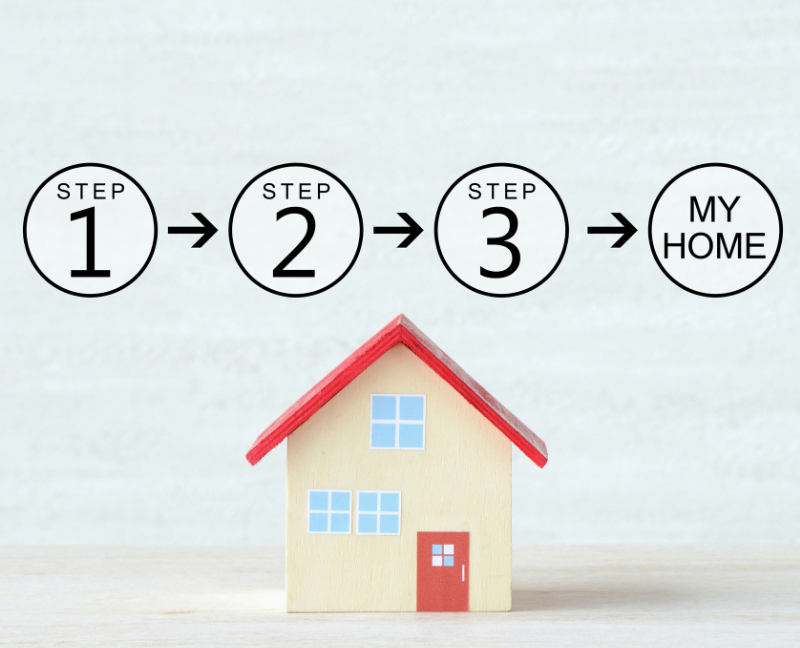
We'll begin by figuring out how much your house is worth. The pricing will be determined by taking into account the item's worth when the repairs are finished.
For homes in rough shape, replacing carpets, painting walls and trim, updating fixtures, cleaning and painting gutters, painting the outside, landscaping, HVAC repairs, foundation repairs, and kitchen and bathroom improvements are some of the most frequent repairs that are factored in.
After that, the profit, holding/selling costs, and repair costs are deducted. After we get the necessary data, we will schedule a meeting to inspect your house. We will then talk about your alternatives after that. We will talk about the cost, the terms of the contract, and the closing date if we can assist you. After that, you can go with a cheque in your pocket and no house.
In addition to offering advice on how to sell your home, we will sell your house for a reasonable price. Selecting a real estate broker is never cheap in case you didn't know. Commissions and sales discounts are typically included in the costs of hiring a real estate agent. They also cover the fees of the survey, closing, and title. The last category is holding costs, which include utilities, taxes, insurance, and yard upkeep. The typical duration of holding costs for a house on the market is between six and nine months.
When you're ready to sell your house, get in touch with our team at RE/MAX Advanced Realty to get started.
Selling your Indianapolis home to a cash buyer? Don’t skip this post!
Here’s the truth: purchasing a home is a HUGE choice. At the end of the day, you want to feel comfortable and confident with your purchase, therefore there are several factors to take into account.
The same thing happens when it’s time to sell your home. Most people overlook this but it goes through the same excruciating process, especially when you are selling for cash. You have to ask yourself different questions, such as:
Do I want to sell your home quickly or not?
Would I be buying a new house after selling this one?
Should I spend my funds to do renovations or repairs for a home I won't be living in?
The first stage when selling a home is determining the goal – don’t skip this and remember, everyone has a different one.
Your goal is to sell your home quickly, but what exactly is quick? Three months? Half a year? One year? Thirty days?
A faster closing is one benefit of selling your home to a cash buyer. In two to four weeks, a normal sale can be closed—that is, signed, sealed, and funded. This is merely because currency is king and since it is simpler, it moves more quickly.
When cash is not available for payment and traditional financing is required, cash removes all potential barriers that are frequently encountered. Since banks manage traditional financing, they have regulations, restrictions, and other requirements that must be fulfilled by the seller and the buyer before approval. These kinds of requirements can slow down the selling process and even drive away potential bidders, and that's an additional consideration.

Do you remember when you were still looking for a home? Remember how easy it is to just walk away when you weren’t interested and go to the next one?
Poor color schemes?
Unattractive counters?
Noticeable ceiling hole?
These items would usually turn off a prospective buyer searching for their next house. They could not want or know the house, they might not have the funds to undertake these kinds of improvements, or they might be concerned that if one repair is required, there probably will be more to come. These are just chores to be completed for a cash buyer. Since time, money, and resources are all involved, nothing terrifies cash purchasers. Cash buyers are familiar with what appeals to and trends in the market, how to sell a house quickly, and what it takes to sell to a larger audience.
It can now be an inherited house instead of your own.
You don't need or want to maintain and care for another house because you already have your own to maintain and repair. Since they have been owned and occupied for a long time, inherited homes are frequently older and require more maintenance. Additionally, inherited homes typically require a great deal of legal work to be obtained, completed, etc. Cash purchasers are experienced with these situations and may handle these matters on your behalf.
Unfortunately, it's a common belief that the only people who would sell their house for cash and at a discount are those who are in a desperate situation. However, none of the reasons mentioned above fit the definition of a desperate seller. Try asking yourself, "What is my ultimate goal?" You can decide whether or not a cash buyer would be the greatest fit for your needs by doing your homework and weighing your possibilities.
Learn more about selling a home by checking these resources.
Whether you're looking for a corner lot to build your dream home on or are hunting for your ideal home, you may have noticed one and wondered if it's a suitable location.
A corner lot is a plot of property located where two streets or roads intersect. The streets usually run along one side and the front of the lot. Corner lots can be found in various places, such as the center of a neighborhood or at the end of a busy street.
When developers first began constructing cookie-cutter McMansions in the 1990s, it was difficult for builders to sell homes on corner lots. Among other things, buyers did not like the increased street visibility, reduced privacy, and noise.
To offset the criticism, some developers chose to charge a premium of $5,000 to $10,000 for these corner sites. This attracted attention, and the lots started to sell. Nowadays, their popularity is more akin to that of living on a dead end. In the current market, a corner lot is always selected because of the features and numerous advantages these pieces of real estate provide buyers.
Before you purchase or construct your next home on this particular kind of unusual zoning lot, we'll go over the advantages and disadvantages of corner lot homes to help you make an informed selection.
The extra yard area that a corner lot provides over other ordinary lots is one of its biggest benefits. This makes it possible for a house to have a distinct layout for the yard and floor design. An excellent curb appeal option would be a side-entry garage rather than a front-entry garage, as the front of your house would not be hidden.
Additionally, you have more space to design outside spaces that may support different activities, such as a pool, kid-friendly play equipment, a larger garden, or just more area for sports or social events.
Since no other houses are typically obstructing the sunshine on three of the four sides, corner lots tend to have higher levels of natural light than other types. As the day goes on, natural light pours into your home from every aspect, especially in properties facing south. Also, most plants that enjoy the light thrive in it.
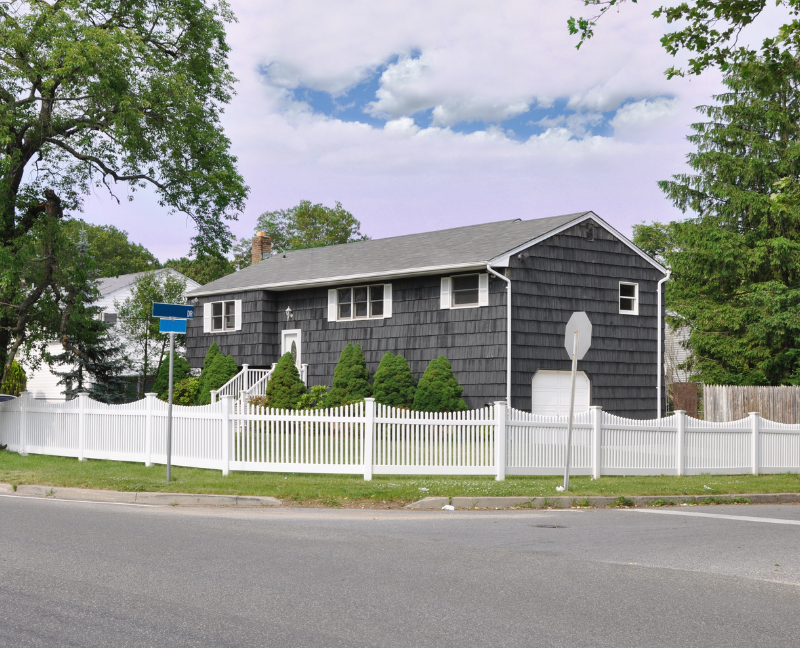
You won't feel nearly as vulnerable when you spend time in your backyard if you only have one neighbor close by. You can erect a privacy fence to keep others from looking in if you're worried about people using the sidewalks. Find out whether there are any fencing limits, particularly about height and material limitations.
Building a house on a corner lot will provide you with a great deal of freedom if you love the spotlight and experimenting with gardening and landscaping ideas because your property will stand out in the area.
Since the yards on these homes are usually larger, they could need more maintenance. When it comes to maintaining your lawns, landscaping, and clearing other debris, be ready to put in more effort. Alternatively, save more cash to hire gardeners and other essential service providers.
Due to their location, corner properties receive a lot more traffic, which increases noise levels, the amount of light coming from headlights beaming inside homes, and, worse, the likelihood of some rather serious accidents caused by drivers breaking stop signs on nearby streets. It still depends on the neighborhood, though, as if the house is in a quiet residential area, you probably won't get much traffic. The position of the windows and the design of the house may also affect how well you sleep at night. When determining the location of the home, decide whether these factors are important to you and speak with your real estate agent.
Due to its corner placement, your home may have greater visibility even though you may have a little more privacy with fewer neighbors around it. The house is more accessible from two streets, which could increase the danger of burglaries. Nevertheless, if you're concerned, there are techniques to reduce those dangers. To get a bird's eye perspective of everything going on surrounding and close to your home, you might think about adding more lights and setting up security cameras in different spots.
So, are you ready for a corner lot? You still have the last say on this. Just as with any other special property location, you have to weigh the advantages and disadvantages, determine what qualities are most essential to you, and research the area and house thoroughly. Lastly, before making a significant choice, speak with your reliable real estate representative. Perhaps the ideal home for you is lurking around the corner, waiting for you to take another look.
As we move into August, it’s a great time to look back and analyze the real estate trends from July. The summer months have provided us with valuable insights into the Indiana housing market, revealing patterns that could influence your real estate decisions. Whether you’re planning to buy, sell, or simply keep an eye on the market, here’s a snapshot of how key Indiana counties performed in July, offering valuable insights into the trends that shaped the market last month.
Comparison Note: Percent change comparisons reflect results from June 2024 to July 2024 for the prior month, and from July 2023 to July 2024 for the prior year. Data provided by MIBOR Listing Cooperative, compiled on August 11, 2024.
Bartholomew County
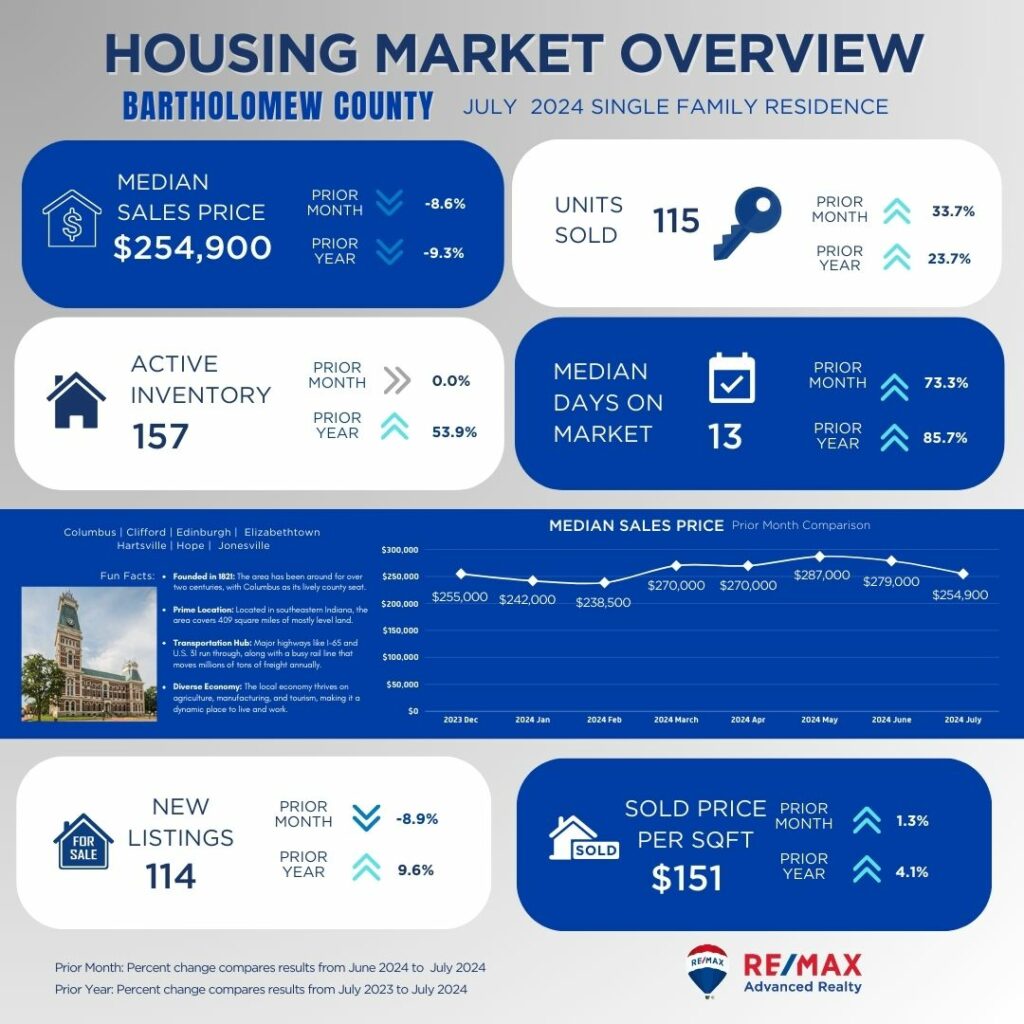
In Bartholomew County, the median sales price has dipped to $254,900, marking a notable decline of 8.6% from last month and 9.3% from last year. This drop in prices might suggest a cooling market, but it's worth noting that the number of units sold has increased significantly by 33.7% compared to the previous month. This rise in sales could indicate that despite lower prices, buyers are actively seizing opportunities. The inventory levels remain stable with 157 active listings, while new listings have slightly decreased, down 8.9% from the prior month.
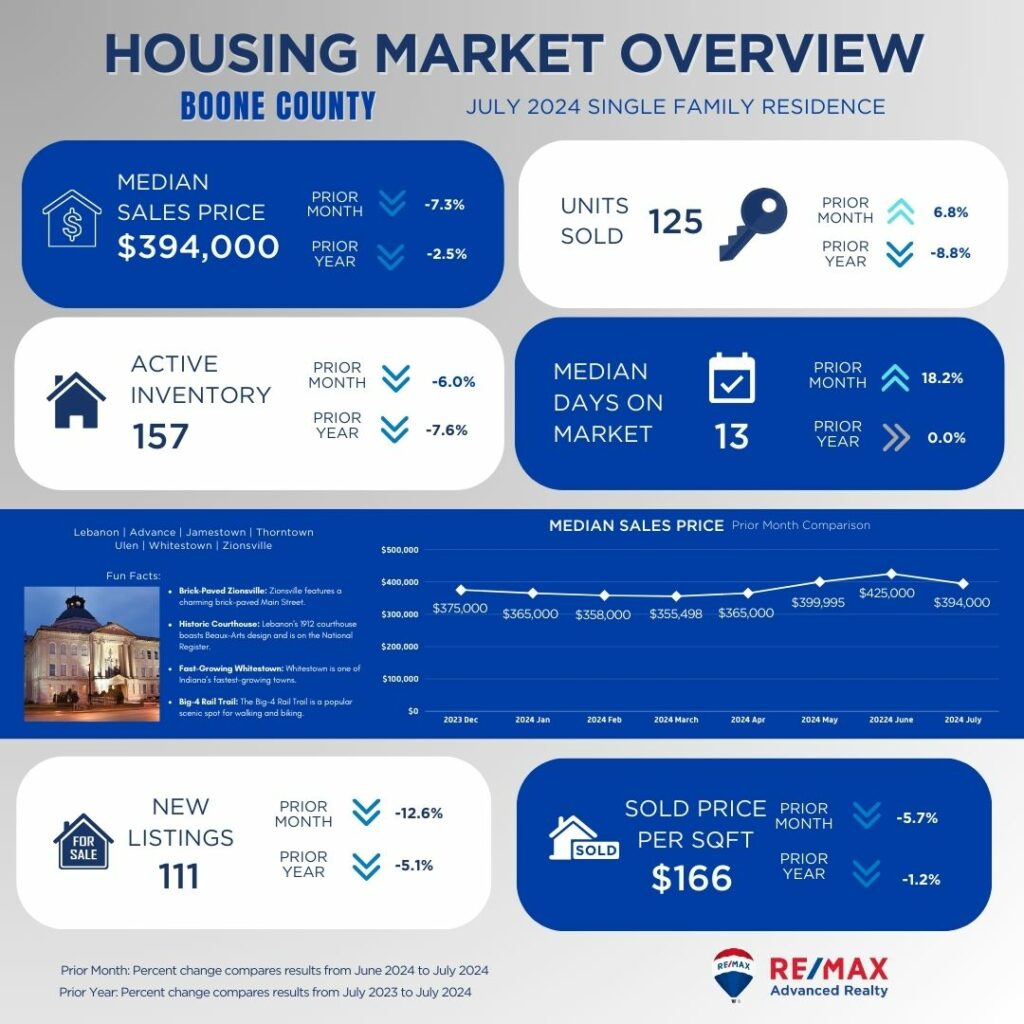
Boone County is seeing a more complex picture. The median sales price of $394,000 represents a decrease of 7.3% from last month, though it’s only a slight drop of 2.5% year-over-year. The number of units sold has seen a 6.8% increase from last month, which might suggest that despite falling prices, the market remains dynamic and active. However, with new listings falling by 12.6%, the active inventory of 157 homes has slightly decreased. The consistent median days on market of 13 days may indicate that well-priced homes are still attracting buyers relatively quickly.
Brown County
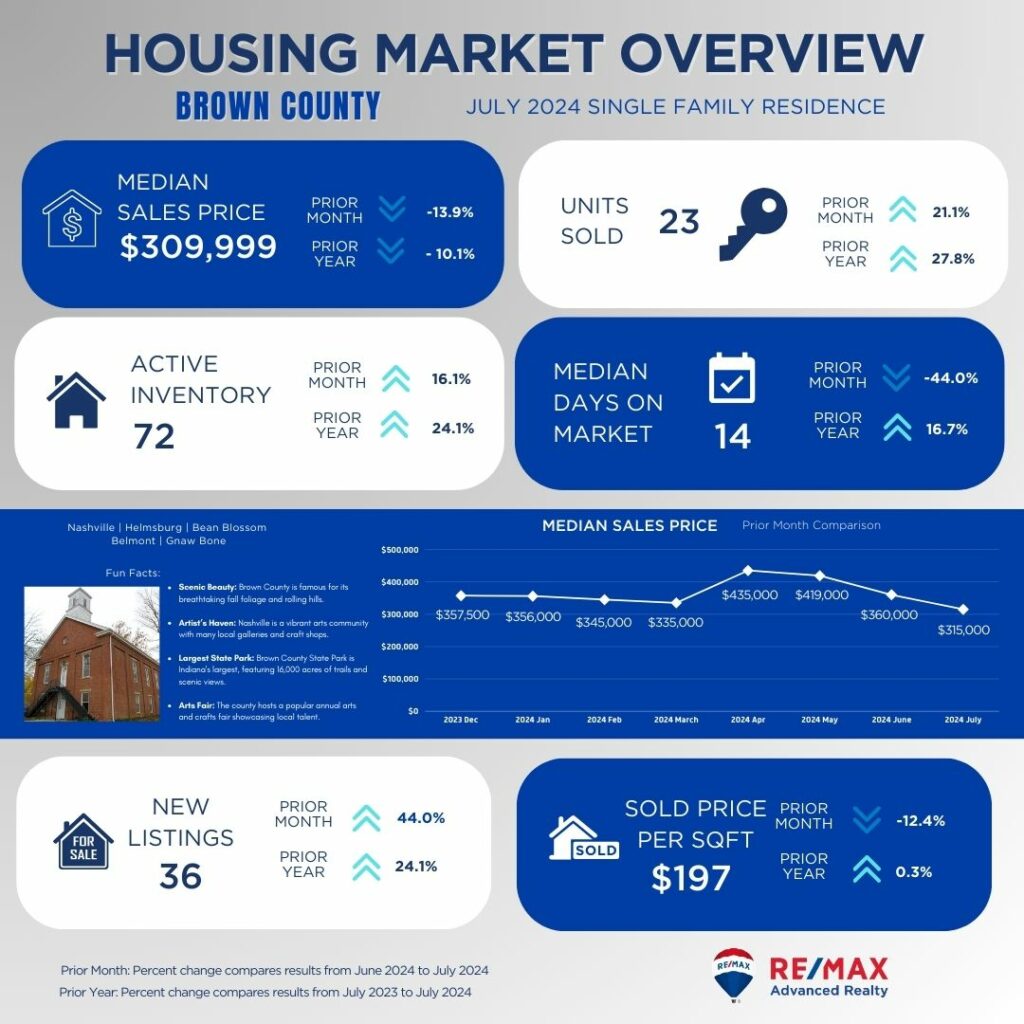
Brown County is experiencing a significant drop in median sales prices, down 13.9% to $309,999. Despite this, units sold have increased by 21.1%, showing a positive trend in sales activity. The rising inventory levels, up 16.1%, might be contributing to this price reduction, providing buyers with more choices. The median days on market have decreased substantially, suggesting a faster-moving market despite the drop in prices.
Decatur County
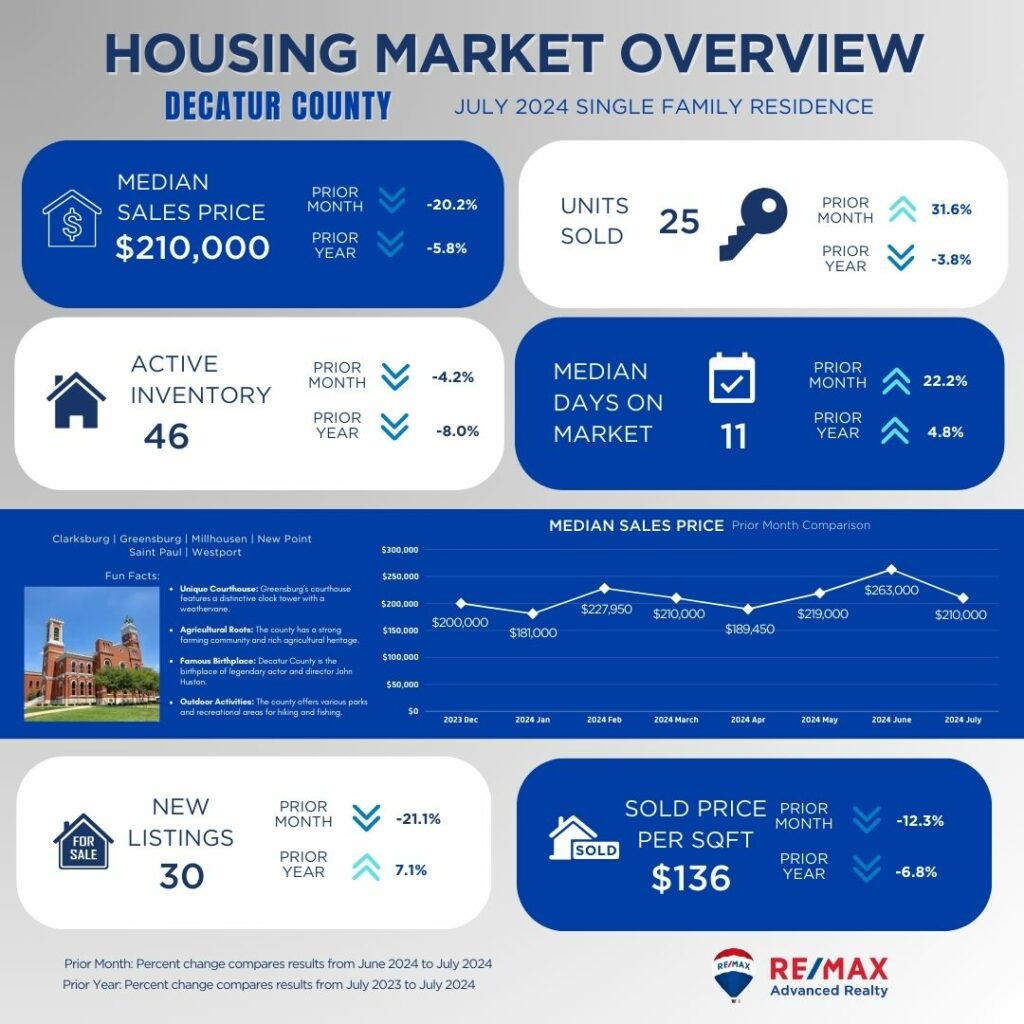
Decatur County presents a different scenario with a dramatic 20.2% drop in median sales price to $210,000. However, the number of units sold has increased by 31.6%, which could indicate that lower prices are driving higher sales volumes. Inventory levels are down slightly, and with a decrease in new listings, the market might be adjusting to these price changes. The reduced median days on market to 11 days shows that homes are selling quicker in this lower-price bracket.
Hamilton County
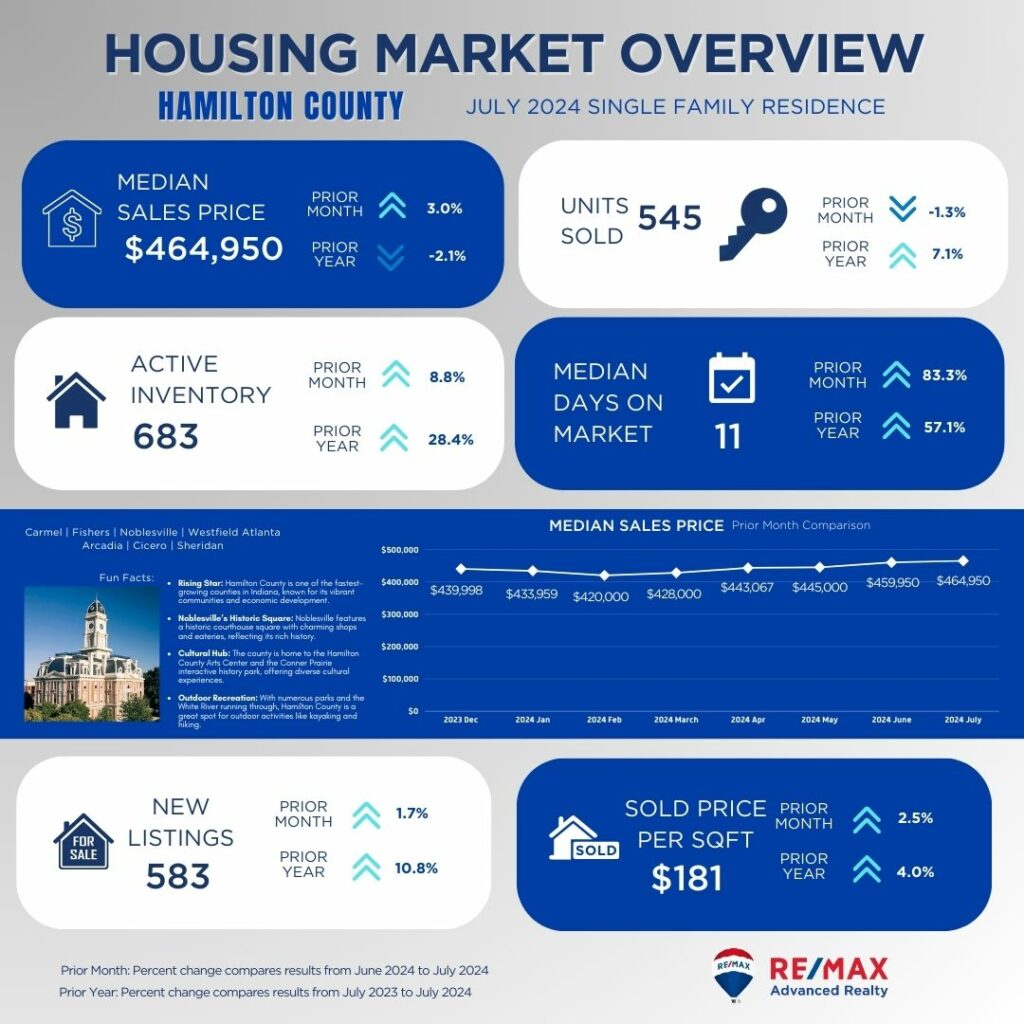
Hamilton County’s market shows resilience with a median sales price of $464,950, up 3.0% from last month. The number of units sold has decreased slightly by 1.3%, but the increase in active inventory and new listings suggests a more balanced market. The median days on market have increased significantly to 11 days, which could be a sign that higher-priced homes are taking a bit longer to sell, possibly due to the higher inventory levels.
Hancock County
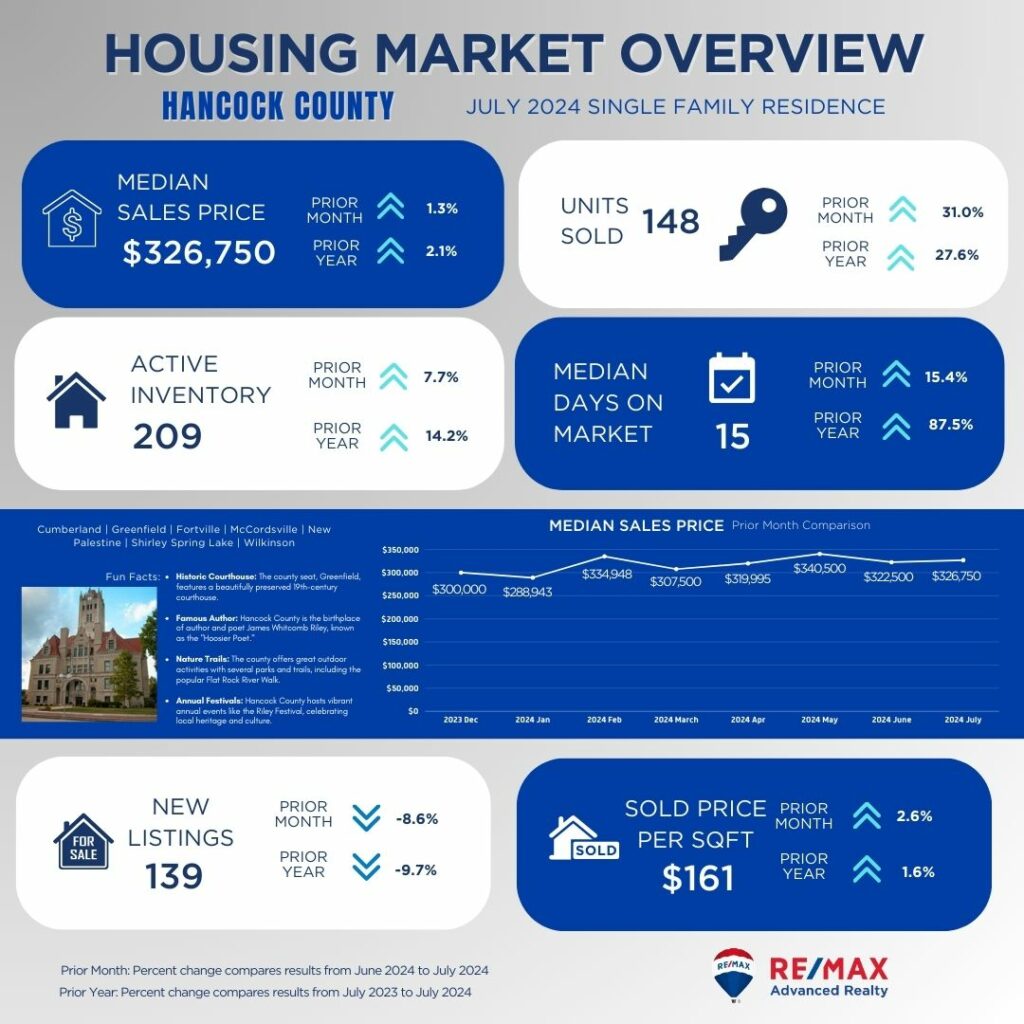
Hancock County is seeing a modest increase in median sales price to $326,750, up 1.3% from last month. Sales activity is strong with a 31.0% increase in units sold, indicating a vibrant market. Despite a slight decrease in new listings, the median days on market is stable, suggesting a healthy demand for homes in this area.
Hendricks County
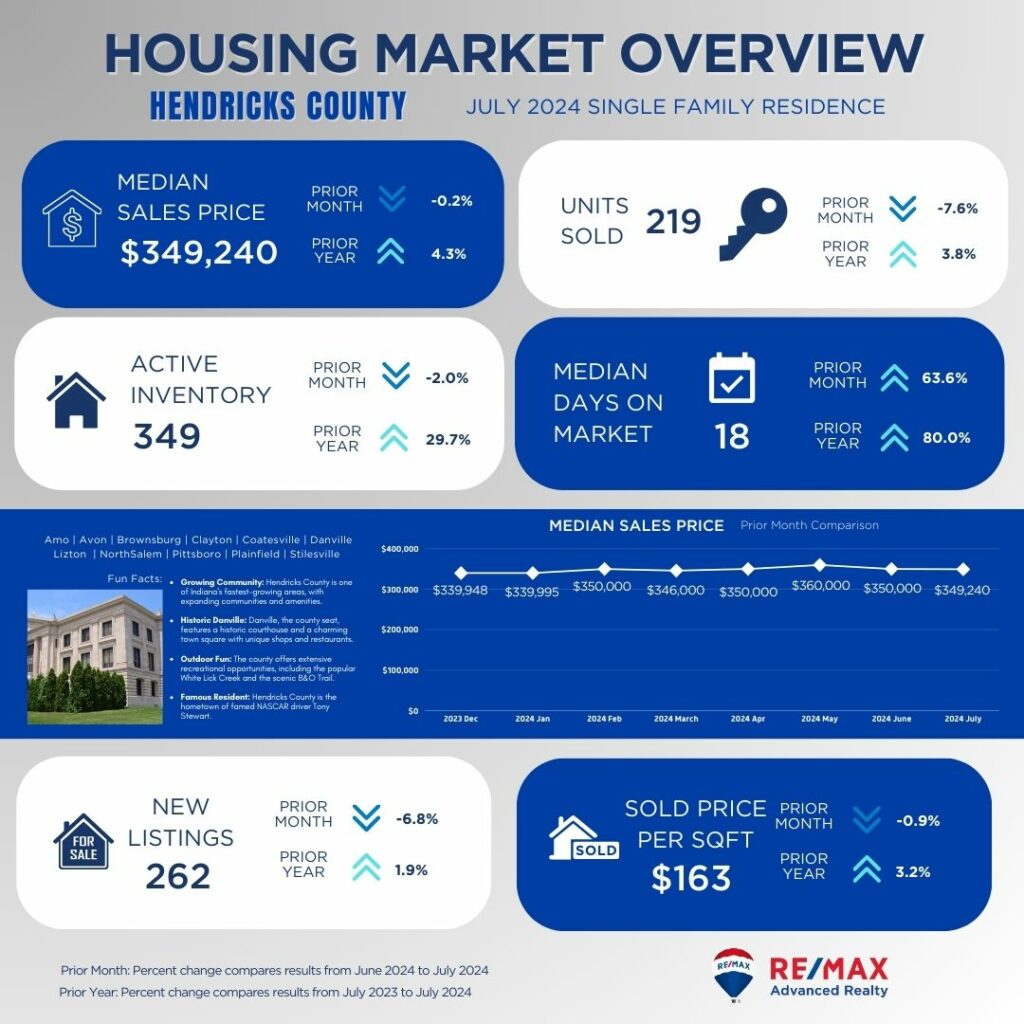
In Hendricks County, the median sales price has remained relatively stable at $349,240, with a slight 0.2% decrease from last month. Sales have slightly decreased by 7.6%, yet the inventory remains manageable with a slight decrease in new listings. The increase in median days on market indicates that while homes are still selling, they may be taking a bit longer to find the right buyer.
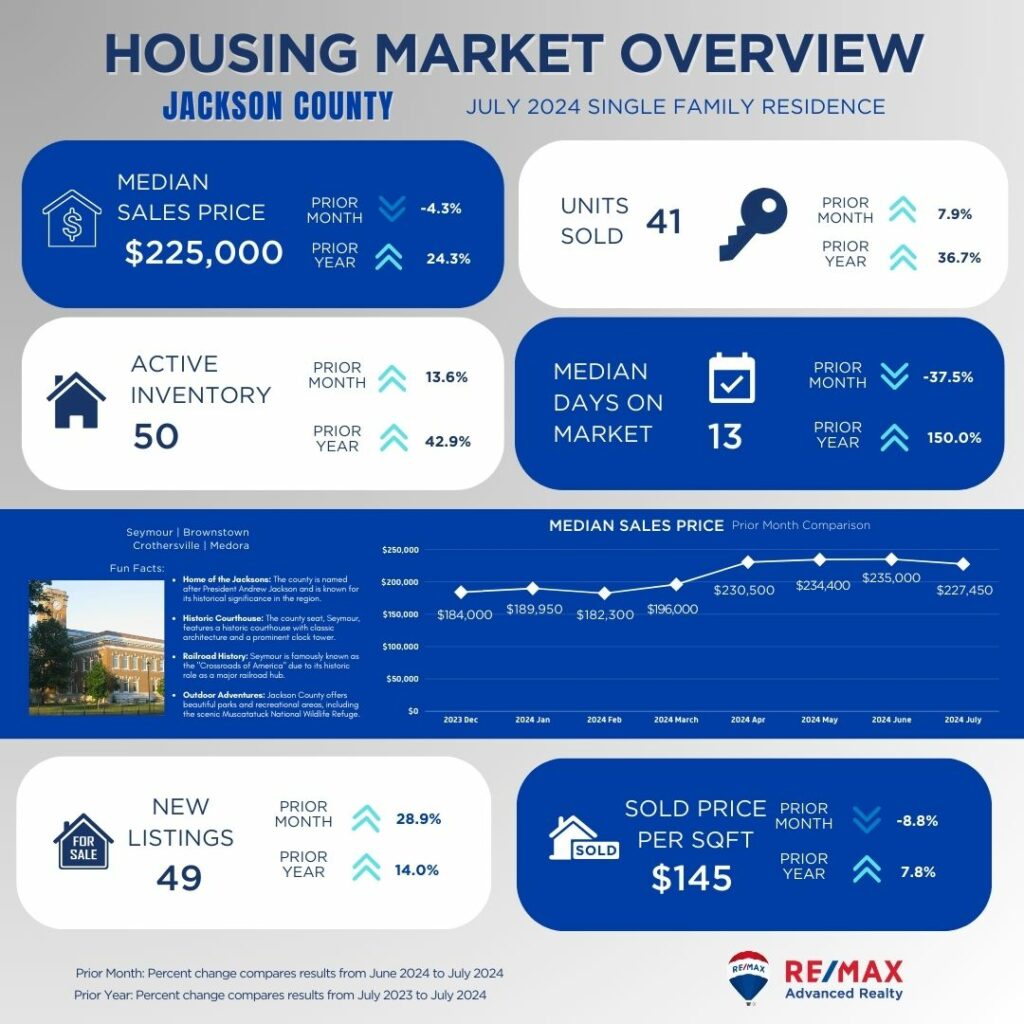
Jackson County has experienced a 4.3% drop in median sales price to $225,000. Despite this, sales activity has increased by 7.9%, and the median days on market have decreased significantly. This suggests that lower prices might be stimulating buyer interest and quicker sales.
Jennings County
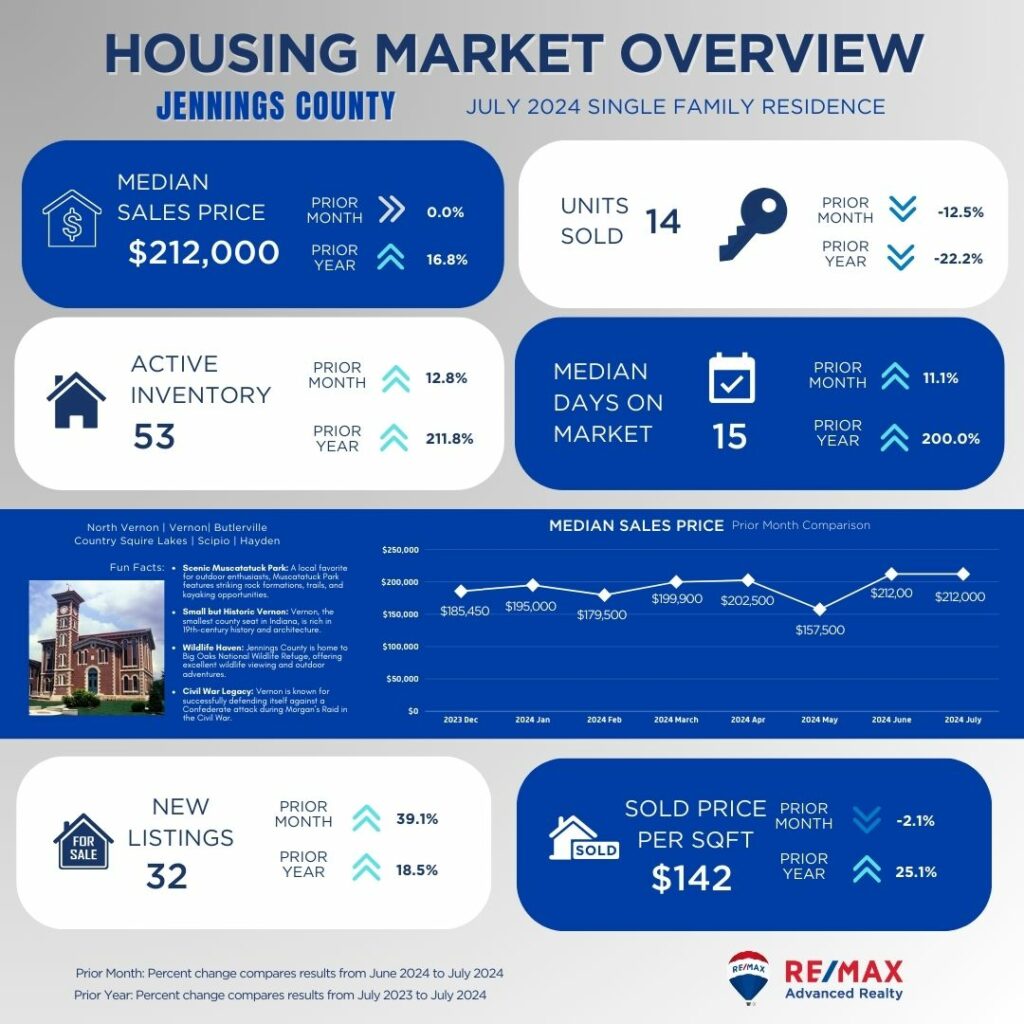
Jennings County’s median sales price has remained steady at $212,000, with no change from the previous month. However, the number of units sold has decreased, suggesting a potential softening in demand. The increase in active inventory and median days on market might indicate a shift toward a more buyer-friendly market.
Johnson County
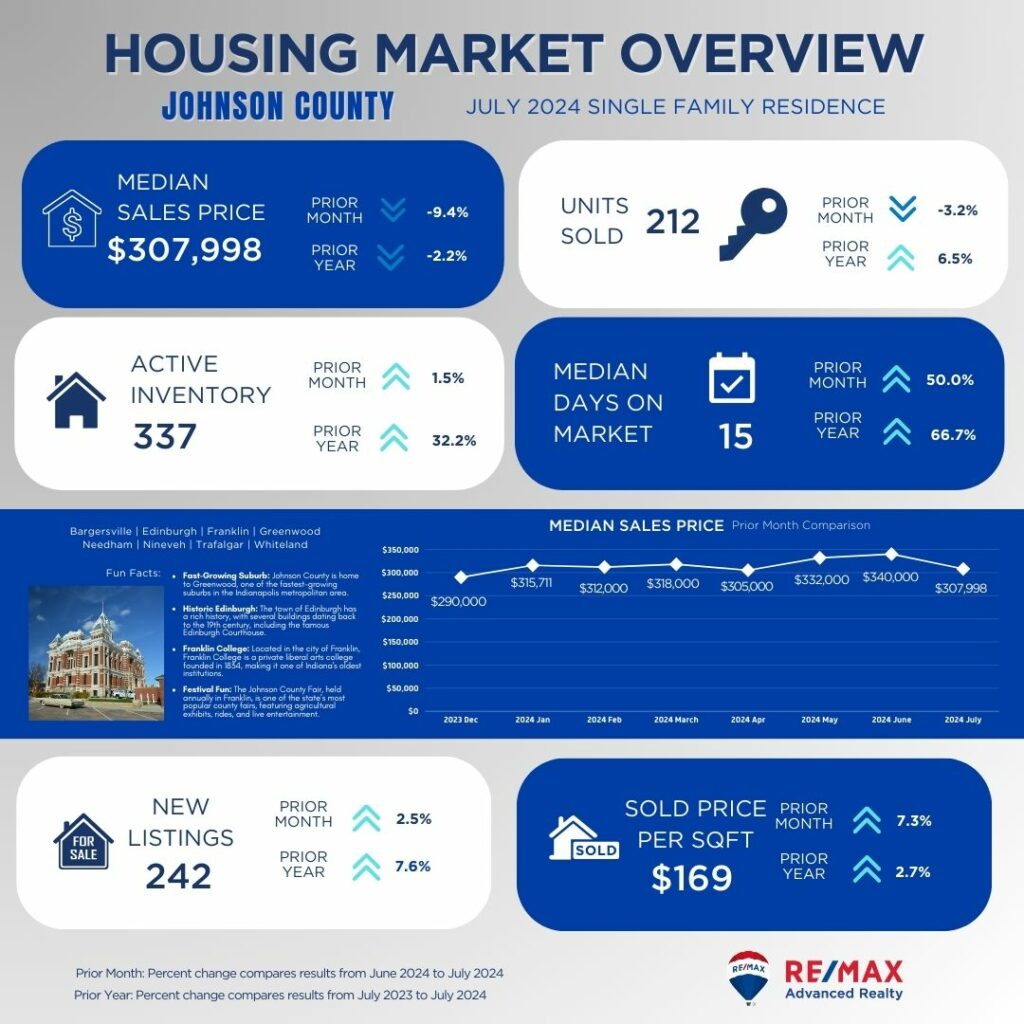
Johnson County’s market shows a decrease in median sales price to $307,998, down 9.4% from last month. Despite this, sales activity remains strong with a decrease in median days on market, indicating that homes are still selling relatively quickly. New listings have slightly increased, suggesting a steady flow of new properties coming onto the market.
Madison County
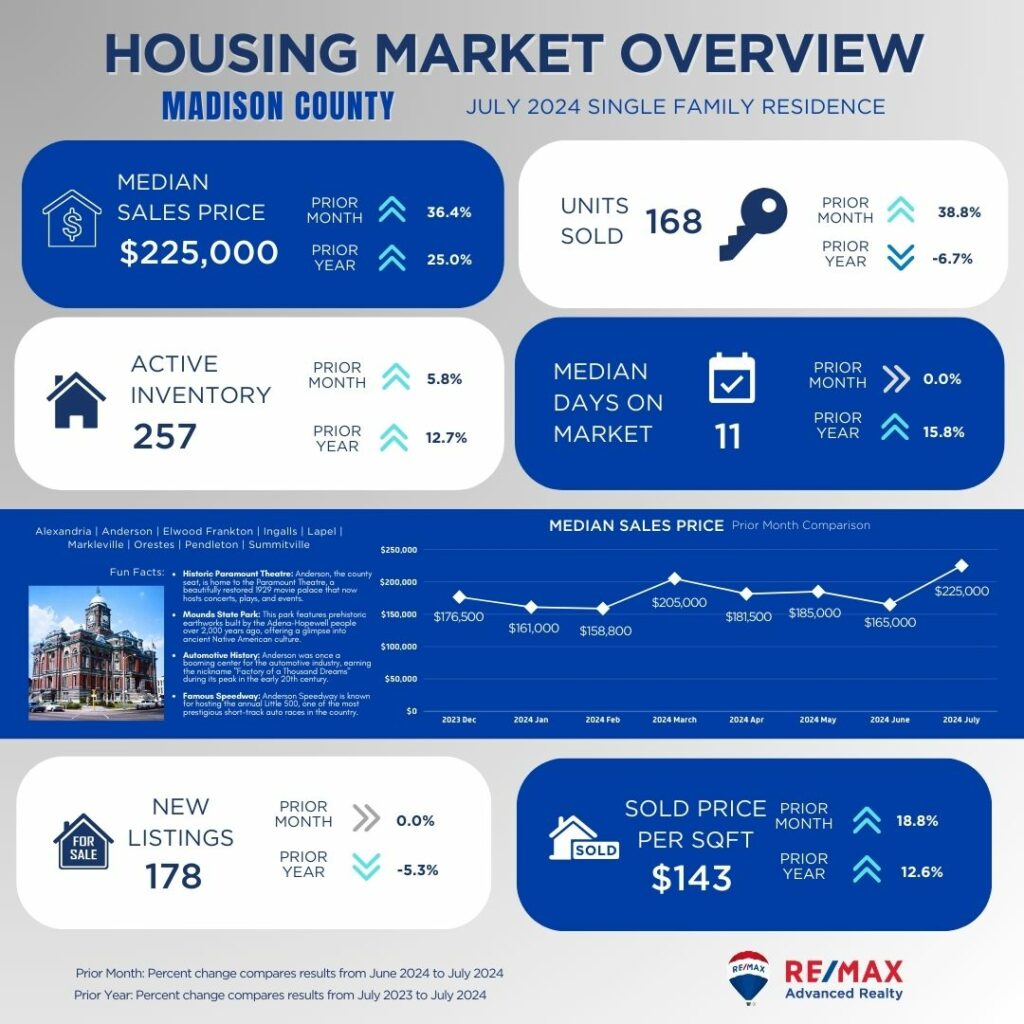
Madison County is experiencing a strong market with a 36.4% increase in median sales price to $225,000. The number of units sold has also increased significantly, suggesting high buyer demand. The stable median days on market indicates that homes are selling at a consistent pace despite the rising prices.
Marion County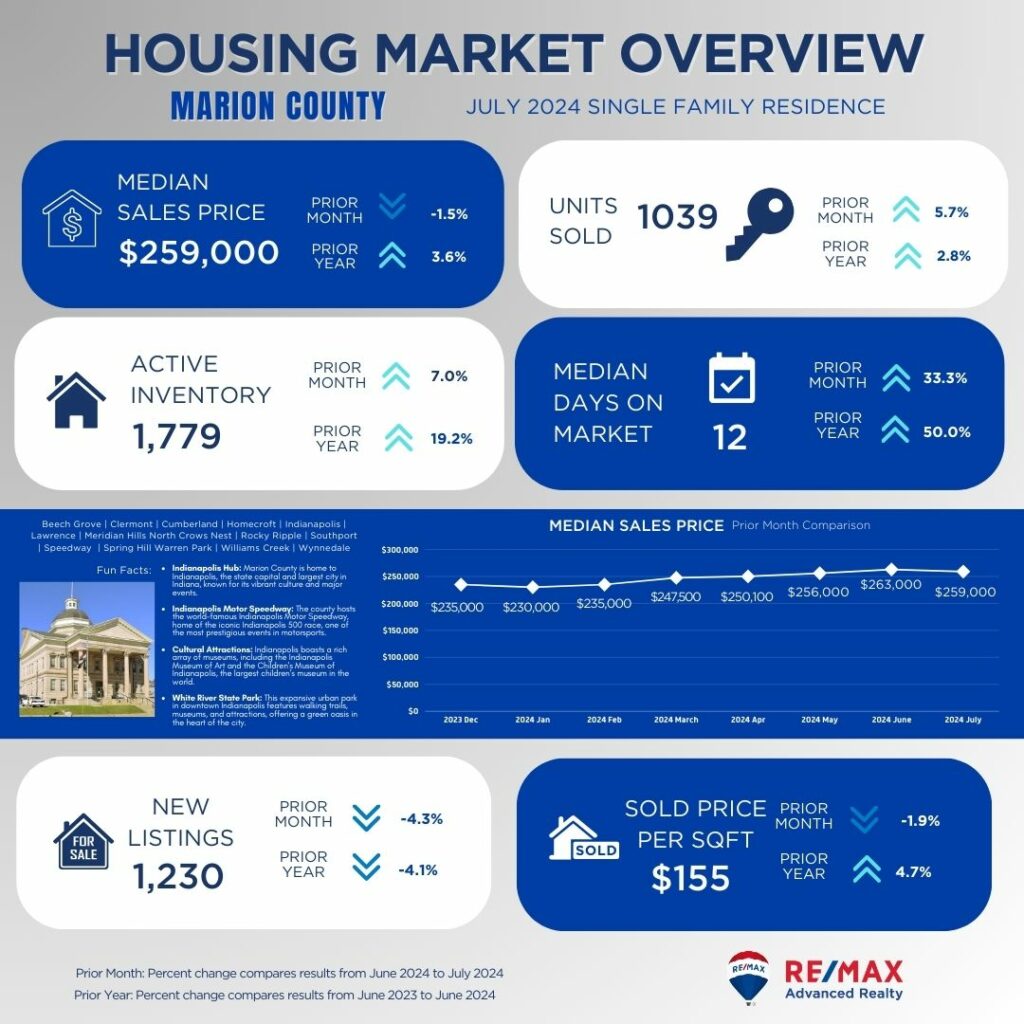
Marion County’s median sales price is $259,000, showing a slight decrease from last month but an increase from last year. The large number of units sold and the increase in active inventory suggest a robust and active market. The decrease in median days on market to 12 days indicates that homes are selling relatively quickly in this large and diverse market.
Montgomery County
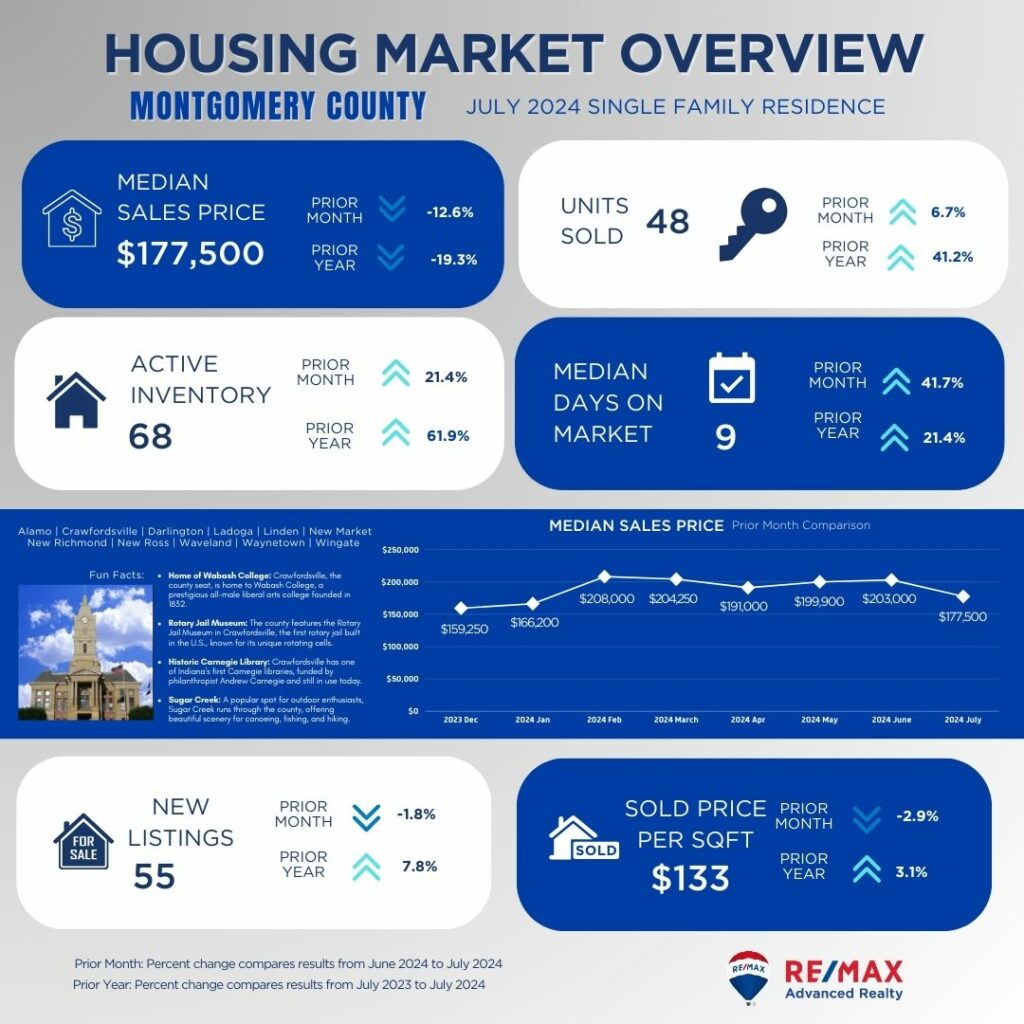
Montgomery County shows a significant decrease in median sales price to $177,500, down 12.6%. Despite this, the number of units sold has increased, suggesting that lower prices are attracting more buyers. The decrease in median days on market indicates that homes are selling faster, likely due to the more attractive pricing.
Morgan County
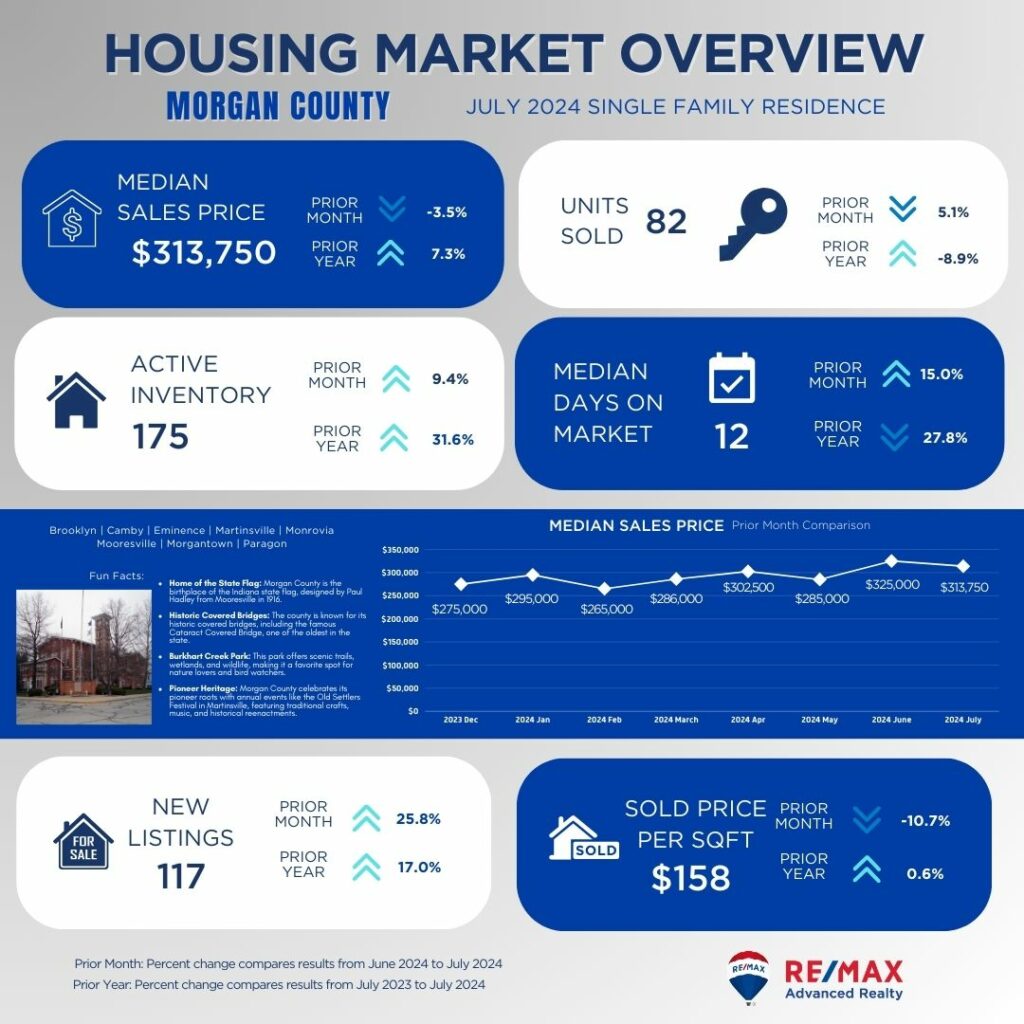
Morgan County has seen a decrease in median sales price to $313,750, down 3.5%. However, sales activity remains strong, and the decrease in median days on market suggests a quick turnover for homes in this area. The increase in active inventory and new listings may offer more options for buyers.
Putnam County
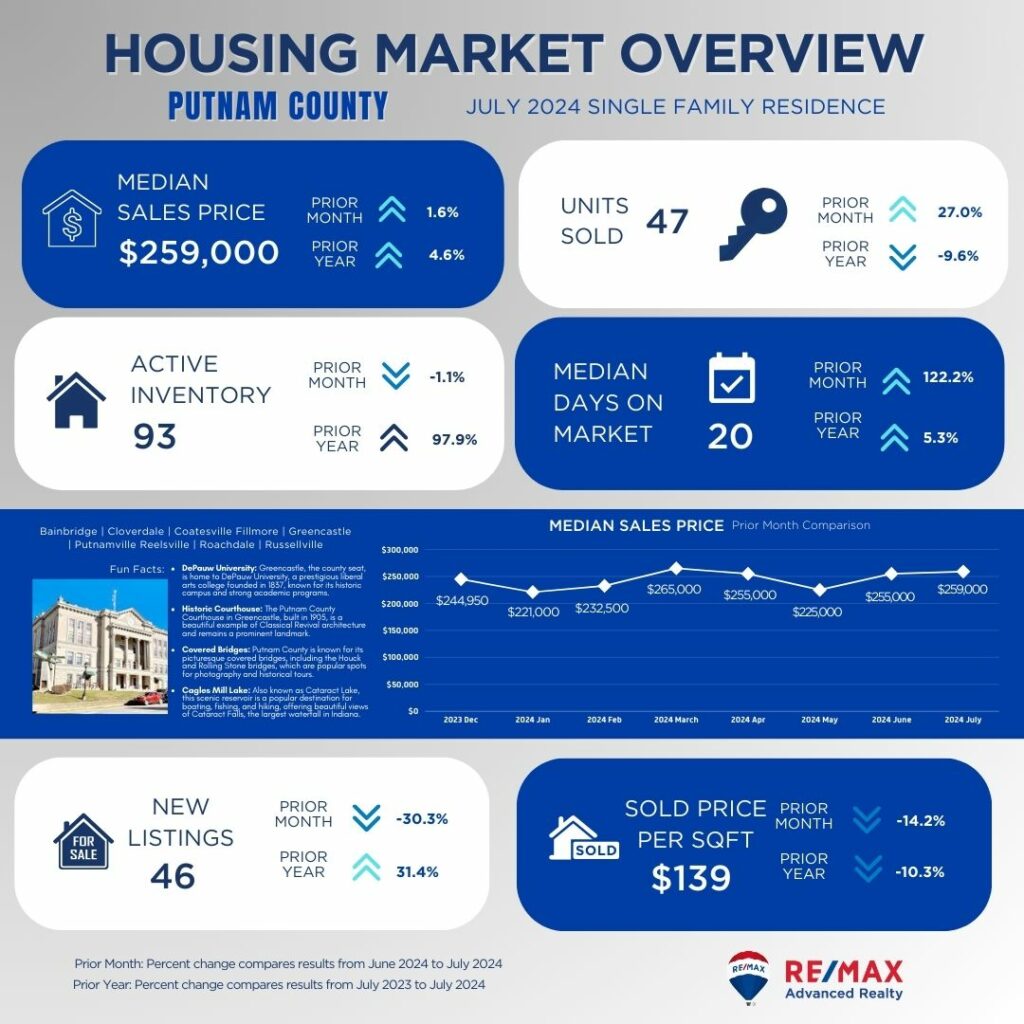
In Putnam County, the median sales price has increased slightly to $259,000. However, the significant decrease in new listings and increase in active inventory suggest a market adjusting to changes. The longer median days on market may indicate that homes are taking a bit longer to sell.
Shelby County
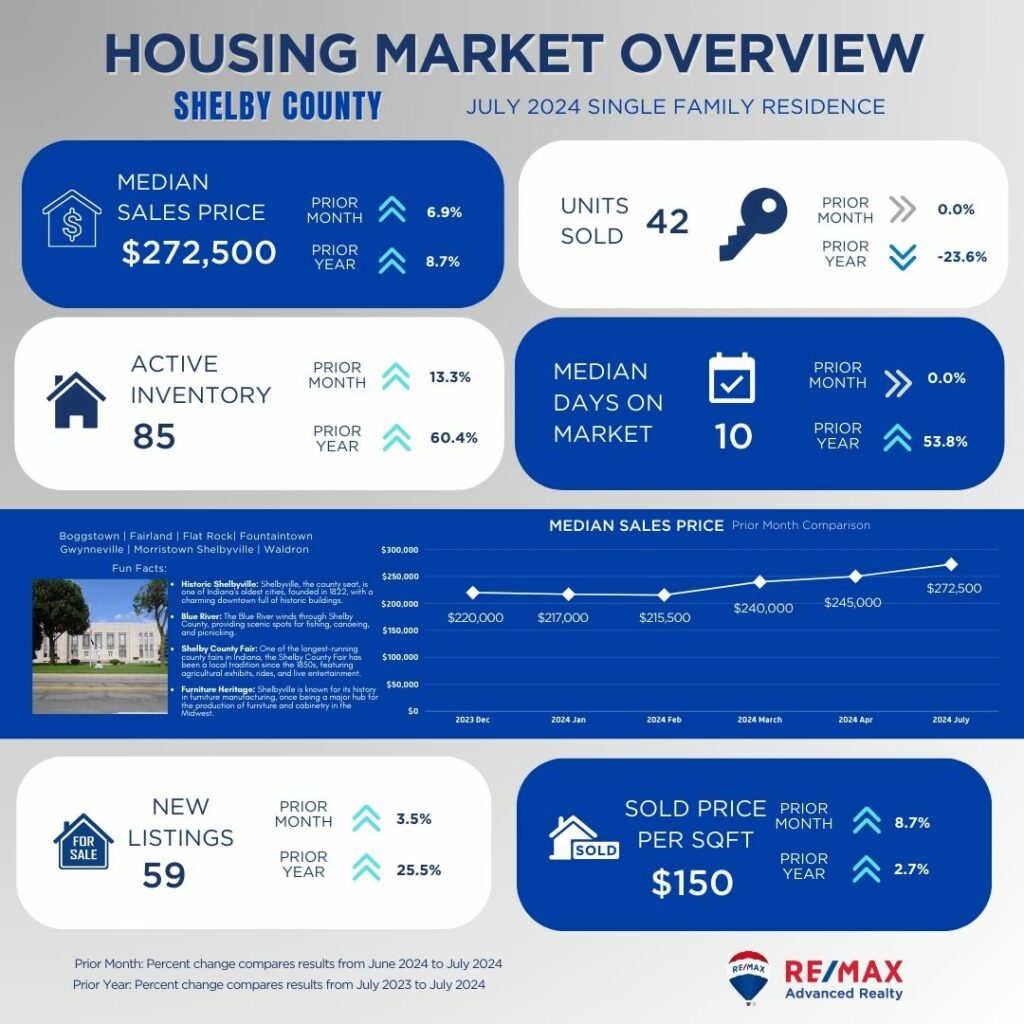
Shelby County has seen an increase in median sales price to $272,500, with a 6.9% rise from last month. Despite a slight decrease in the number of units sold, the increase in median days on market suggests that while prices are rising, homes are taking longer to sell.
As you consider these insights, remember that local market conditions can vary widely. If you’re thinking about buying or selling, it’s always a good idea to consult with a local real estate expert who can provide personalized advice based on your specific needs and goals. Reach out to Indy’s leading brokerage, RE/MAX Advanced Realty, at 317-298-0961 (West Office) and 317-881-3700 (Greenwood Office) to connect with experienced professionals who can help you navigate the current market trends and make informed decisions.
The living room is frequently called the "heart" of the home, and there is a good reason for this perception. It is the focus for friends and family get-togethers and fulfills several functions. A friendly and well-arranged living room may create an excellent first impression on visitors and help them feel at home.
The living room has many uses because it is such a flexible area. Its design and decor affect the home's overall appeal. A well-planned living room may give the entire home feel cozy, while a poorly constructed one does the opposite.
There are many things you can do in the living room, which can also serve as a workspace, a reading area, or a music room. Thus, giving it the right attention as well as an upgrade is always a good idea. Here are ways how to make this room more welcoming and elegant.
A lighting source, whether it be a floor, table, or ceiling lamp, may also make a statement. Consider using dramatic lighting accents like large lampshades, a glitzy gold lamp base, or a contemporary crystal chandelier. A space can have a high-style focal point with a shining finish or an enormous size.

The brass chandelier and table lamps in this room lend the black-and-yellow color scheme a striking, opulent radiance.
Budget Tip: Budget-friendly glamorous lighting choices are undoubtedly possible. You may find crystal ceiling fittings that cost less than $200. For elegant floor and table lamps, check big-box stores for striking designs that cost less than $100.
Mirrors are the ideal piece of furniture to add light, create the appearance of greater space, and give off a glitzy, luxurious vibe. A huge mirror over a sofa, credenza, or focal point, like a fireplace, should be hung.

In this white living room, a collection of simple, large mirrors creates a chic background for the white couches. It gives just the appropriate amount of glitz without giving the room the appearance of an ostentatious jewel box.
Budget Tip: Oversized mirrors don't need to be elaborate to look opulent. If a large mirror isn't available, consider clustering smaller mirrors to achieve a like look.
The larger the canvas or framed piece of art in the living room, the more upscale the space will appear. Large artwork gives an expensive-looking gallery appearance.

A regular white cabinet in this room becomes the focal point of the room thanks to a giant artwork painted in metallic gold. The striking black lamp adds even more drama to the wall.
Budget Tip: It can be difficult to choose affordable art that has a high-end appearance. It's challenging since art is individualized and subjective. Look through your local flea markets or online marketplaces like Chairish and Etsy for reasonably priced solutions. A huge original painted canvas or framed print usually looks more upscale than a giclée or printed canvas. Your living space can have a gallery-like atmosphere by using basic shapes and forms that you like, that provide drama, or a flash of color.
Your space will appear larger with a rug that can comfortably fit beneath all of your key pieces of furniture, including the coffee table, sofa, and armchairs. When trying to elevate the standard of design and elegance in a living room, this is crucial.

This area's huge carpeting highlights every piece of furniture. Its vastness allows the eye to move about and take in the room's expanse, which includes the colorful pouf and chic accent chair. This is how the room would appear if there was just a tiny rug beneath the coffee table. A modest size would resemble a bath mat and give the impression that the room is smaller.
Budget Tip: While sisal and jute are natural fiber carpets, they might be more affordable than large rugs. To give them a softer feel, they are occasionally woven with other materials. As an alternative, search for cozy-textured indoor-outdoor rugs.
Hang window coverings from the ceiling or as high up on the wall as you can. Elevated placement, a common characteristic in luxury living rooms, adds volume and offers the illusion of a higher ceiling.

Budget Tip: If you can't afford pricey curtain panels, you may still give your space a more upscale appearance by hanging more of them, or doubling up on the panels. Most curtain materials appear more opulent when they have thicker bunched panels. You can also hide any subpar detailing or quality in your drapes by doubling the number. Even less expensive curtains typically look more expensive when they have a consistent hue and some texture.
It is possible to make your living room feel more inviting and comfortable without spending so much. All you have to do is add in a little creativity along with research.
As always, you can check our website to see more design inspirations.
Choosing whether to buy or rent a home can be a difficult decision for a lot of people. Both approaches have benefits and drawbacks.
That said, it's important to consider different factors before moving into a new home, whether it's rented or not. After all, both are big financial decisions.
To assist you in choosing the best course of action, we will weigh the benefits and drawbacks of purchasing vs renting a property in Indiana in this guide.
When you purchase a home, you become the owner. This implies that you are in total control of the property and can make any changes without a landlord's consent. Remember that you will need to abide by the HOA and municipal ordinances though. If not, you can paint the walls any color you like, replace the flooring, hang pictures, and do other things that you normally couldn't do in a rental. Furthermore, you will accumulate equity in the house over time, raising your net worth. If you've owned the house long enough and have equity in it, you will be able to sell it for a profit. Let's continue our discussion regarding these benefits.
Return On Investment
The ability to earn a sizable return on your investment is one of the biggest benefits of owning a property as opposed to renting, provided you make an informed decision. Most homes increase in value over time if they are well-maintained. This is particularly valid if you purchase in a sought-after area. Because of appreciation, you may be able to sell your house for more money than you paid when you originally bought it, which would increase your bank account balance.
Stability
It is impossible to predict whether a landlord will modify the terms of the rental agreement, raise the rate, or renew the lease. On the other hand, you can live in your house for as long as you choose and you know exactly how much your monthly payment will be when you own it.
Initial Cost
The initial outlay is among the biggest drawbacks of being a property owner. The majority of lenders demand a down payment of 5% to 20%. However, bear in mind that many lending programs call for either no down payment or a much smaller down payment. Closing costs range from 2 to 5 percent of the purchase price on average. Closing costs are normally the buyer's duty, although many buyers bargain with the sellers to have some of the fees covered.
Repairs And Maintenance
The continuous expenses associated with home ownership include upkeep and repairs. For the property to appreciate, upkeep is required. A house, however, is a long-term investment that, should you want to sell, can yield a profit.
Property Taxes
Lastly, property taxes are going to be your responsibility. The price is determined by your home's size, lot size, and location. As previously said, the return on your home can easily offset the expenses.
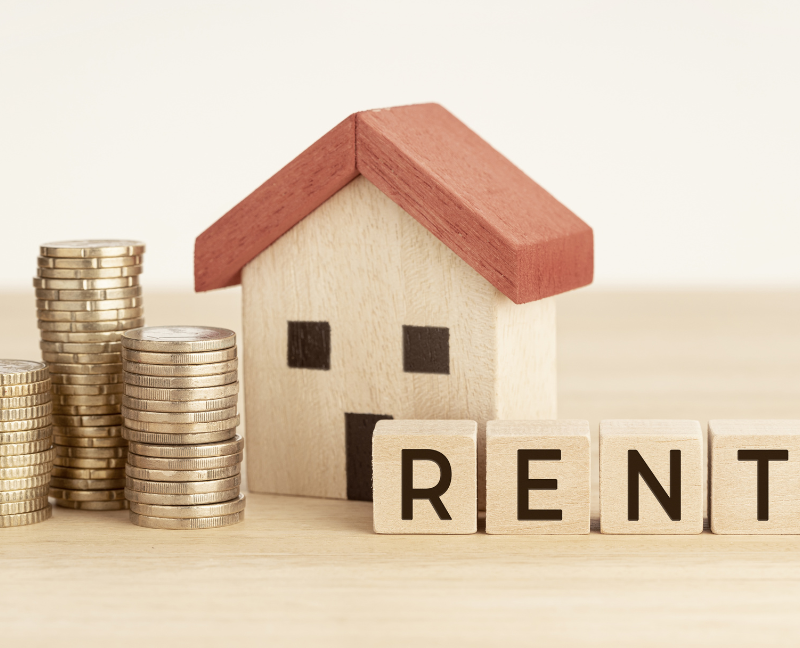
For those who lack the funds or are not ready to commit to home ownership, renting a property can be a great choice because it provides a lot of flexibility. Renting allows you to move about as much as you like, which is advantageous if you're not sure where you want to live in the long run. Let's find out the benefits and drawbacks of renting a house in more detail.
Affordable in the Short Term
Due to the absence of closing costs and a down payment, renting may appear more reasonable in the short term. Furthermore, you have no responsibility for upkeep or repairs related to the property. However, bear in mind that your rent payments will not be reimbursed to you in equity.
Little To No Maintenance
You are not in charge of any upkeep when you rent. On the other hand, you are not given the option to choose when or how the problem is resolved. This may cause you much frustration. Owning a property gives you the freedom to decide when and how to fix upkeep and repairs.
Must Follow Rules
You have to follow the rules set down by your landlord. You have to abide by the rules, no matter how strict the landlord is. You now have less influence over your life and living circumstances as a result. Many believe that their home is the only location where they can do anything they want. With a rental, this isn't the case. For instance, a lot of landlords forbid tenants from nailing décor to the walls. Remember that landlords are also accountable.
No Equity
In reality, you might as well be paying twice as much for someone else's mortgage. When you move out, there's no chance to produce a profit or receive a return on your investment.
Whether to buy or rent a house ultimately depends on your own circumstances. Buying could be the best option for you if you have the money to do so and are prepared to make a long-term commitment to one location. When the time comes to sell, you will receive a return on your investment from this long-term investment that has appreciated over time.
Need help deciding which one is right for you? Our team at RE/MAX Advanced Realty is here to help! Talk to us today so we can assist you with your concerns.
Imagine spending a hot day reading a book or sipping a beverage while relaxing by your own swimming pool. Meanwhile, the children, laughing and playing on their pool floats or practicing their dive.
Having a pool at home has long been considered a perk that only elites usually have. However, while others see it as essential, others think it's a deal-breaker.
To find out if installing an in-ground pool is worth it or not, especially if it's the best way to boost home value, make sure to read the entire post.
In the meantime, if you want to know how to boost the value of your home, here are some other free resources:
In-ground pool owners may anticipate a 56% return on their investment, according to the National Association of REALTORS® Remodeling Impact Report: Outdoor Features for 2023.
When it's time to sell, your home's worth may rise by a maximum of 7%, according to HouseLogic. However, that all relies on several different things, such as:

The report stated that landscape experts calculated the price of constructing an in-ground pool to be $90,000. A conventional filtration system, three to seven feet of depth, and walls made of gunite (a mixture of sand, water, and cement) are included in the price mentioned. The pool measures eighteen by thirty-six feet.
The cost of installing an inground pool can range from $80 to $250 per square foot, or a total of $25,000 to $100,000, depending on its size and material. Not to mention, tailored renovations or additions will incur additional costs, such as lighting, a diving board or slide, a heater, and landscaping.
Additionally, to keep kids and pets safe around water and to prevent accidents, the majority of jurisdictions mandate the installation of safety elements including covers, enclosures, and fences. For example, the cost of pool fencing alone might range from $5,000 to $15,000.
Sanitation is necessary to keep bacteria and germs under control in your swimming pool, regardless of its style or composition. In order to maintain the right pH, alkalinity, and calcium levels, the water must also be balanced. These are just a few of the annual and monthly expenses that come with owning a swimming pool and can affect its value.
A pool structure is usually covered by a normal home insurance policy without the need for a separate rider. However, if you intend to build a pool on your land, think about speaking with your insurance provider about how having a pool can impact your premiums and raise your liability coverage. Furthermore, if you fail to install a pool fence, your insurance may refuse to cover your pool and your liability claim in the event of an accident occurring in your pool.
While installing a pool may raise your yearly property taxes in some places, it may not affect how much your house sells for.
The only person who can accurately assess the return on investment of a luxury purchase like a swimming pool is you, the homeowner. Whether it improves your quality of life by providing a space for leisure, relaxation, and memorable occasions is up to you to determine.
According to the NAR Remodeling Impact Report, homeowners who added a pool reported a "joy score" of 10 on a scale of 1 to 10, suggesting that the addition significantly affected their sense of satisfaction and achievement following the project's completion. Additionally, after adding an in-ground pool, at least 90% of respondents said they enjoy their time at home more. That can be difficult to quantify.
You live here at the end of the day. Go ahead, jump in, and enjoy the swim if you intend to establish roots, have the funds, and have thought through the advantages and disadvantages of building a pool.
Many people have false beliefs about leading an eco-friendly lifestyle, especially the notion that it's costly, difficult, and calls for a full head of dreadlocks.
Being green really isn't that hard; all it takes is one small adjustment at a time to benefit the environment.
And here's the huge bonus: You may frequently save money by implementing these tiny lifestyle adjustments.
Here are the eco-friendly tips for home that can help save money:
For most homes, energy costs represent a considerable monthly expense, and domestic energy use significantly contributes to environmental problems. Improving energy efficiency can substantially lessen your influence on the environment and electricity costs. Still, some of these improvements require much effort and money.
In addition to discounted costs for energy-efficient upgrades and appliances, several utility providers now give free energy audits and rebate programs. Look for deals you can take advantage of by first visiting the websites of your gas and electric suppliers. In addition, you can determine if you qualify for any federal income tax credits associated with energy conservation.
After exploring these promos and incentive programs, inventory your home for energy efficiency improvements and investigate low-cost renovations to reduce energy consumption:
Summer may be filled with more activities compared to other seasons, so it might require an effort to find enough time to clean, organize, and refresh your home. After all, doing so has environmental, financial, and even mental benefits for you and your family.
Here are some ideas for recycling, reusing, and reducing items that are already in your home:

There are many cheap, eco-friendly things you can do on your lawn that could have a beneficial impact on your finances and the environment, such as:
Plastic water bottles that are only used once are extremely wasteful and harmful to the environment.
Three times as much water is needed to make one water bottle as there are in one due to the plastic production process, yet an estimated 80% of them are not recycled!
Regretfully, they wind up in landfills or the ocean since individuals frequently neglect to recycle them correctly.
Purchasing a reusable, appropriately sized water bottle will solve this issue and allow you to carry it with you everywhere you go.
Long-term cost savings are also achieved by reusing water bottles since fewer plastic bottles will need to be bought.
Reducing your meat intake can actually have a significant positive impact on the environment.
Livestock operations occupy more than thirty percent of the Earth's surface.
In line with a UN research, “the livestock sector accounts for 9 percent of CO2 deriving from human-related activities, but produces a much larger share of even more harmful greenhouse gases. It generates 65 percent of human-related nitrous oxide, which has 296 times the Global Warming Potential (GWP) of CO2.”
Reducing your meat intake is a significant step in lowering your total GWP gas emissions.
We can enjoy and use more land for pleasure when there are less cattle on it.
Think about eating more fish or substituting veggies for some of your meat-heavy meals!
First of all, you don’t have to completely get rid of your paper towels; however, use them sparingly as much as you can.
Comparing the seven most popular ways for drying hands, researchers at Massachusetts Institute of Technology (MIT) discovered that using paper towels results in 70% more carbon emissions than using hand dryers with cold air.
Even though you most likely don't have a hand dryer at home, drying off with a cotton towel is 48% more environmentally friendly than using a paper towel.
When the time comes for your spring cleaning, chop up an old t-shirt and use it as a cloth instead of buying a dozen rolls of paper towels.
Since you were going to discard it anyhow, why not make financial and environmental savings simultaneously?
Gather all of your used rags into a basket and give them a quick wash.
Reuse, reuse, reuse!
Light switches are beside the door for a reason!
Turn them off whenever you leave a room, and especially when you leave the house. This will help you save energy and money on your energy bill.
Your ability to save energy by shutting off the lights will vary depending on the kind of bulbs you use.
An incandescent lightbulb is among the least energy-efficient forms of illumination available.
Just 10% of the energy used by incandescent light bulbs is converted to light; the remaining 90% is wasted as heat.
Therefore, you can save more energy in your home by turning off your incandescent light bulbs.
Since halogen lights employ the same technology as incandescent light bulbs, turning them off when not in use can also help cut energy bills.
It is also necessary to turn off compact fluorescent lights, or CFLs, according to the usual rule of thumb.
If you plan to be back in your room in fifteen minutes, you can leave the lights on.
But turning them off is more energy-efficient if you leave your home for longer than fifteen minutes.
Your CFL bulbs' lifespan will also be increased by using this technique.
Nevertheless, turning on or off Light Emitting Diodes, or LED bulbs, will not have an impact on them.
One of the key features of LED bulbs that makes them perfect for energy conservation at home is this.
Additionally, you can use sensors to turn them fully on and off instantaneously and to turn them on and off automatically.
Other than this, unplug appliances when you’re not using them.
Want more tips on taking care of your home and living an eco-friendly lifestyle? Why not check our free resources by clicking this link.

8313 W. 10th St
Indianapolis IN 46234
dennis@indyhomepros.com
317-316-8224